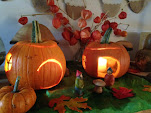
Wormwood is bitter yet full of comfort
This poor little herb has such a marred history even being banned in some countries. I am sure there is some truth to the concerns of wormwood however in my experience occasional use has not led to any problems. In fact Absinthe is available in our local ABC store now. I only write from personal experience and caution anyone reading this to do their own research before taking any herbs internally.
I have read that wormwood received its name because historically it was used to rid ones self of intestinal worms, fortunately I have not had to test wormwood’s effectiveness against worms, but I have found that both wormwood tea and wormwood tinctures are great to ease stomach upsets and tea is often used to aid with divination and to cleanse magical items.
Wormwood is easy to grow, it prefers dry soil, rich in nitrogen but I have seen it grow in the wild in all types of conditions. I have a small wormwood patch growing in my kitchen garden pictured above. If you do plant wormwood make sure to plant it by itself or in a container because it secrets a toxin to other plants (or so I have read, yet I still have to weed the area my wormwood grows in frequently).
When harvesting wormwood for internal use I only choose new growth. I find the older bigger leaves too bitter and save those for use in incense or to make magical teas with.
Allow the herbs to dry, I usually just hang in small bundles, but you can place them on cookie sheets on low heat in the oven if you need to dry them quicker. Once the herb is dry crumble it with a mortar and pestle and store in an airtight container away from sunlight.
When making tea to ingest I usually use 1-2 teaspoons per cup, if using for stomach upset it is better to not add any sweetener or other herbs to help alleviate the bitter flavor. It is the bitter flavor that signals to our bodies to produce bile to help with digestion. If you drinking the tea for divination purposes feel free to add any other herbs or sweeteners you choose. If you are using tea externally to wash or bless magical items you can make the tea as strong as you feel you need. I usually use older leaves and steams to make wormwood wash.
To make a tincture I use fresh leaves picked mid to late August and fill a ball jar with the leaves. Then I cover with a strong alcohol, I use Rain Vodka because it is made with organic corn here in the U.S., but any alcohol over 80 proof will work fine. Then I seal the jar and let sit for 6 weeks (make sure you label your tincture and when you made it) I often leave the jar on my counter top so I can give it a good shake and add more alcohol if needed. After six weeks I strain the liquid from the plant matter and put into dropper bottles again making sure to label the contents and the date.
To take the tincture I add 30-60 drops to a shot glass of warm water and take before heavy meals.
Other uses for wormwood include teas to ease labor pains, washes for bruises and sore joints and as a bug spray when combined with pennyroyal and citronella.
To make bug spray make a very strong tincture of pennyroyal, citronella and wormwood then place in a spray bottle. Spray yourself before going out but do not use around young children or pregnant women.
I keep a dried sprig of wormwood tucked inside my tarot cards and often burn as incense when doing divination work.
I have heard of others stuffing pillows with wormwood to aid with dream work.
Despite the reputation wormwood has earned I have not nothing but positive experiences with it aside from a few hangovers in my younger years for indulging in to much absinthe. I hope this gives you some ideas on how to work with wormwood, but as with anything if it does not feel right for you don’t use it.








